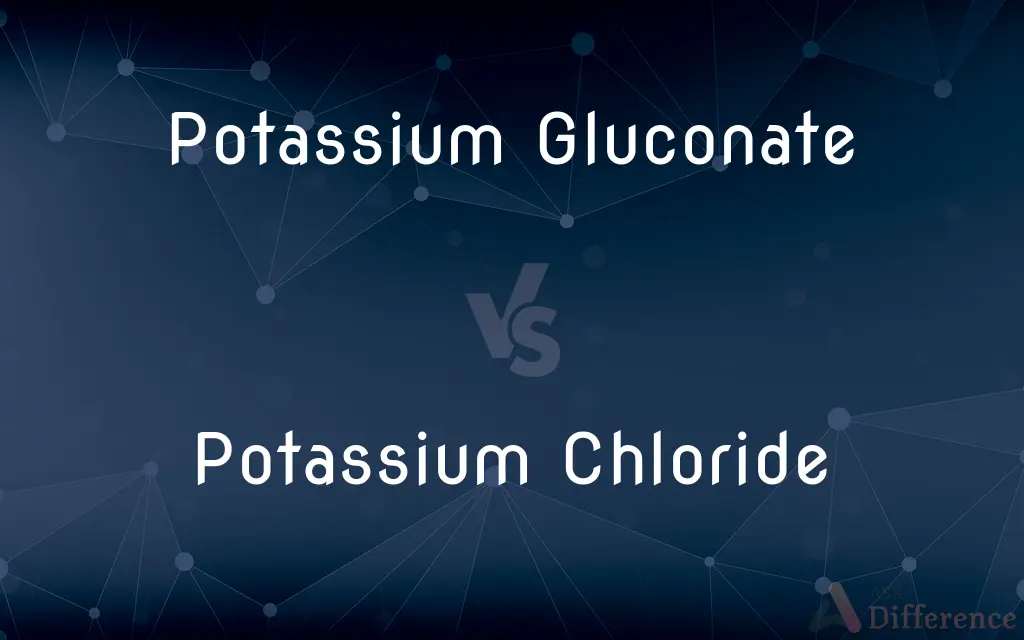Potassium Gluconate vs. Potassium Chloride — What's the Difference?
By Tayyaba Rehman — Published on November 13, 2023
Potassium Gluconate is a potassium salt of gluconic acid, commonly used as a supplement, while Potassium Chloride is a salt of potassium and chlorine, often used as a medication and in food processing.

Difference Between Potassium Gluconate and Potassium Chloride
Table of Contents
ADVERTISEMENT
Key Differences
Potassium Gluconate, as the name suggests, is derived from gluconic acid. This compound finds its primary use as a dietary supplement to treat low potassium levels or prevent them from dropping. Ensuring appropriate potassium levels in the body is essential, as potassium plays a vital role in nerve function, muscle contraction, and maintaining a regular heart rhythm. Potassium Gluconate serves to deliver the needed potassium in a form that's easily absorbable by the body.
Potassium Chloride, on the other hand, is a metal halide salt comprising potassium and chlorine. It's commonly known for its use in medical treatments, especially for those with hypokalemia (low blood potassium). Furthermore, Potassium Chloride finds application in the food industry as a salt substitute because of its similar taste profile to table salt, though with a slightly bitter aftertaste.
Comparing Potassium Gluconate and Potassium Chloride directly, the key difference lies in their respective anionic components: gluconate versus chloride. While both provide potassium, their secondary components and applications can vary. For instance, while Potassium Chloride's taste similarity to salt makes it a preferred choice for certain dietary needs, Potassium Gluconate might be favored for its gentler effect on the stomach in supplement form.
However, it's essential to note that both compounds can increase potassium levels in the body. Elevated potassium levels (hyperkalemia) can be just as detrimental as low levels. As a result, both Potassium Gluconate and Potassium Chloride should be taken under appropriate guidance, especially if used for medical reasons.
Comparison Chart
Chemical Composition
Potassium salt of gluconic acid.
Salt comprising potassium and chlorine.
ADVERTISEMENT
Primary Use
Dietary supplement.
Medication and salt substitute in food.
Taste
Neutral.
Similar to table salt but with a bitter aftertaste.
Medical Application
Treat or prevent low potassium levels.
Treat hypokalemia (low blood potassium).
Industry Application
Limited industrial applications.
Widely used in food processing and as a salt alternative.
Compare with Definitions
Potassium Gluconate
Helps maintain regular heart rhythm.
Taking Potassium Gluconate can assist those with irregular heartbeats.
Potassium Chloride
Commonly found as a salt substitute.
Those on a low-sodium diet might use Potassium Chloride instead of regular table salt.
Potassium Gluconate
Commonly used as a dietary supplement.
Many turn to Potassium Gluconate when they need a boost in potassium.
Potassium Chloride
Used to treat hypokalemia.
Patients with low potassium might be prescribed Potassium Chloride.
Potassium Gluconate
Easily absorbable form of potassium.
For efficient absorption, many prefer Potassium Gluconate over other potassium compounds.
Potassium Chloride
Has a taste profile similar to table salt.
While similar, some detect a bitter aftertaste in Potassium Chloride.
Potassium Gluconate
A potassium salt of gluconic acid.
Potassium Gluconate supplements help maintain adequate potassium levels in the body.
Potassium Chloride
A metal halide salt of potassium and chlorine.
Potassium Chloride is often found in medical settings.
Potassium Gluconate
Essential for nerve and muscle cell functioning.
Adequate levels of Potassium Gluconate aid in ensuring smooth nerve transmissions.
Potassium Chloride
Essential in certain food processing methods.
Many food products incorporate Potassium Chloride for flavor or preservation purposes.
Common Curiosities
Is the taste of Potassium Gluconate similar to Potassium Chloride?
No, Potassium Gluconate has a neutral taste, while Potassium Chloride tastes like salt with a slight bitterness.
How is Potassium Chloride different from Potassium Gluconate?
Potassium Chloride is a metal halide salt used in medicine and food, whereas Potassium Gluconate is derived from gluconic acid and is a supplement.
What is Potassium Gluconate?
Potassium Gluconate is a potassium salt of gluconic acid, primarily used as a dietary supplement.
Do both compounds have the same amount of potassium?
No, the potassium content varies due to differences in molecular weight and structure.
Which one is better for treating low potassium levels?
Both can treat low potassium levels, but the choice depends on individual needs and medical guidance.
Are both compounds naturally occurring?
While they can be found in nature, commercial preparations are often synthetically produced.
Is it safe to mix Potassium Gluconate and Potassium Chloride?
Combining them can lead to excessive potassium intake; always consult a healthcare professional.
Can Potassium Gluconate be used as a salt substitute like Potassium Chloride?
While Potassium Gluconate provides potassium, it's not typically used as a salt substitute, unlike Potassium Chloride.
Is Potassium Gluconate used in the food industry?
It's not as commonly used as Potassium Chloride, which acts as a salt substitute.
Can high consumption of Potassium Chloride or Potassium Gluconate be harmful?
Yes, excessive intake can lead to hyperkalemia, which is potentially dangerous.
Is Potassium Chloride safe for all diets?
While it's used as a salt alternative, those with certain health conditions should consult a doctor before use.
Why might someone choose Potassium Gluconate over Potassium Chloride?
It might be gentler on the stomach or preferred for its specific form of potassium.
Do both compounds interact with medications in the same way?
No, interactions can vary, and individuals should consult with a doctor about potential interactions.
In what forms are Potassium Chloride and Potassium Gluconate available?
Both are available in pill, powder, and liquid forms, though specific availability may vary.
How is Potassium Gluconate produced?
It's produced by fermenting glucose, leading to gluconic acid, which is then neutralized with potassium hydroxide.
Share Your Discovery

Previous Comparison
Cubic Feet vs. Square Feet
Next Comparison
MP4 vs. 3GPAuthor Spotlight
Written by
Tayyaba RehmanTayyaba Rehman is a distinguished writer, currently serving as a primary contributor to askdifference.com. As a researcher in semantics and etymology, Tayyaba's passion for the complexity of languages and their distinctions has found a perfect home on the platform. Tayyaba delves into the intricacies of language, distinguishing between commonly confused words and phrases, thereby providing clarity for readers worldwide.
















































